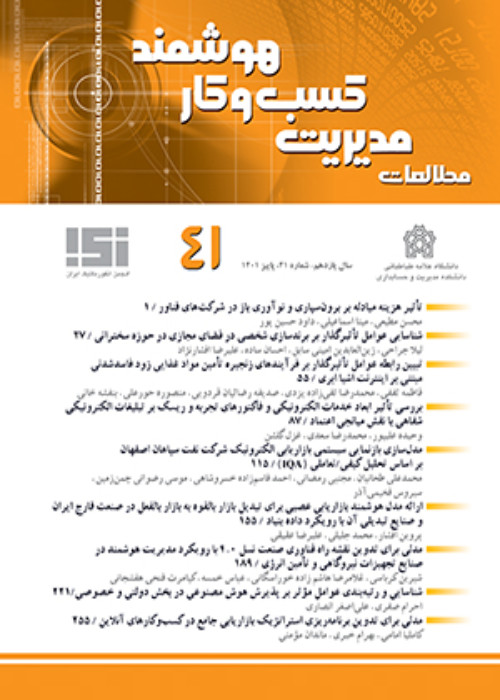The Role of big data in the future of the banking industry with scenario planning approach
This research has been done with the aim of developing Iran's banking scenarios with an emphasis on big data. The current research is practical in terms of orientation and exploratory in terms of the goal. It is also mixed in terms of its philosophical, pragmatic and methodological foundations. To carry out the research in the first stage, 20 key drivers of the research were extracted through literature review and interviews with banking and technology experts. After screening with the fuzzy Delphi method, 8 factors were removed and the rest were evaluated with the Marcus decision making technique. The findings of the research show that the two factors of "technology regulation" and "technology transfer costs" were chosen as key uncertainties for developing research scenarios. Based on these two key uncertainties, four scenarios were developed based on interviews with the focus group with the titles of comprehensive banking, static banking, searching banking, wandering banking. In the comprehensive banking scenario, everything is in its optimal state; Technology transfer costs have decreased and regulators are supportive of the technologies. According to the findings of the research, considering drivers, key uncertainties and alternative scenarios by managers and decision makers can improve the performance and increase the competitive advantage of banks.
Financial innovations has been challenged the banking sector and can improve it. They cover a variety of financial businesses such as online lending, asset management platforms, trading management, mobile payment platforms, etc. All these services generate a large amount of data every day (Hasan et al, 2020: 1). Analyzing this volume of data is difficult, giving rise to the concept of "big data" (Munawar et al, 2020: 2). Big data as one of the important fields of future technology has attracted the attention of various industries (Raguseo & Vitari, 2018: 5206). In general, big data refers to a large volume of structured or unstructured data that is generated and stored at a high speed (Dicuonzo et al, 2019: 41). Big data has found its position in the banking industry; Because of the useful data they have stored in recent years (Rakhman et al, 2019: 1632). Recent applications of big data in banking have been for improving customer relationship management, marketing, optimizing strategic management and human resources (Parmar, 2018: 33; Hassani et al, 2018: 2). Therefore, it can be said that nowadays big data plays a major role in providing financial and banking services, and the realization of its potential benefits in banking is more from technical aspects and affects the organizational structure of banking and mobilizes a large number of different actors (Diniz et al, 2018: 151- 152). With changes in customer expectations and increased competition, the banking industry is no longer able to ignore technological innovations in the banking sector. Due to the numerous applications and benefits of big data in various industries, including the banking industry, and it's becoming more widespread in the future, this technology is becoming a prominent research topic (Phan & Tran, 2022: 6.)
What are the plausible scenarios for banking in Iran with an emphasis on big data?
Many studies conducted in the field of banking and big data deal with the role of big data in improving the performance of the banking industry (for instance: Shakya & Smys, 2021; Gonsalves & Jadhav, 2020; Hung et al, 2020; Parmar, 2018). Also, another part of the studies conducted with a future research approach in the banking sector without focusing on innovative financial technologies and specifically big data (for instance: Baumgartner & Peter, 2022; Eskandari et al,2020). The focus on innovative banking and financial technologies with a Futures Studies approach has been weak (for instance: Maja & Letaba, 2022; Murinde et al, 2022; Hajiheydari et al, 2021; Broby, 2021; Harris & Wonglimpiyarat, 2019). And the role of big data in the Futures Studies of the banking industry has been seen to be very limited due to the relatively large amount of data available in banks and its effect on performance and gaining a competitive advantage (for instance: Valero et al, 2020). Therefore, despite the studies conducted in the field of banking and big data, some of these researches have paid attention to the present time, and the researches conducted in the future of the banking industry have also been without focusing on the role of big data. Now, the most important theoretical gap in research is the lack of studies on the future of banking in Iran with an emphasis on big data.
The current research is pragmatism due to the use of qualitative and quantitative methods from the perspective of philosophical foundations. It is also exploratory in terms of purpose due to the identification of drivers and practical in terms of direction due to the application of the results in the analysis of the future of banking in Iran. In the current research, two methods of literature review and interviews with experts are used to identify drivers, both of which are qualitative methods. According to Popper, the interview tool is based on the expert dimension. The literature review is evidence-based and uses articles and scientific texts to identify factors. Fuzzy Delphi, which is semi-quantitative and evidence-based, is used to screen and determine key drivers that require great accuracy. Then, to determine the key uncertainties, the MARCOS technique is used based on the importance and uncertainty indicators of the Global Business Network (GBN) approach, which is a quantitative and evidence-based technique. Finally, interviews with focus groups are used to write the scenario, which is a qualitative method based on the expert dimension. The theoretical community of the research includes academic experts and managers of the banking sector and are aware of new banking and financial technologies (Fintechs) and specifically big data. The selection of the participants is based on their knowledge and nobility of the research topic and the importance of their presence in the research, and finally 15 people were selected by purposeful sampling using the snowball method. Experts have at least 10 years of relevant work experience and a master's degree.
This research has clarified the situation of this area by identifying the shaping factors and drivers of the future of banking in Iran. Two factors of "technology regulation" and "technology transfer costs" were chosen as key uncertainties for developing research scenarios. Based on these two key uncertainties, four scenarios were developed based on interviews with the focus group with the titles of comprehensive banking, static banking, searching banking, wandering banking. In the comprehensive banking scenario, everything is in its optimal state; Technology transfer costs have decreased and regulators are supportive of the technologies. Considering drivers, key uncertainties and alternative scenarios by managers and decision makers can improve the performance and increase the competitive advantage of banks.
- حق عضویت دریافتی صرف حمایت از نشریات عضو و نگهداری، تکمیل و توسعه مگیران میشود.
- پرداخت حق اشتراک و دانلود مقالات اجازه بازنشر آن در سایر رسانههای چاپی و دیجیتال را به کاربر نمیدهد.




